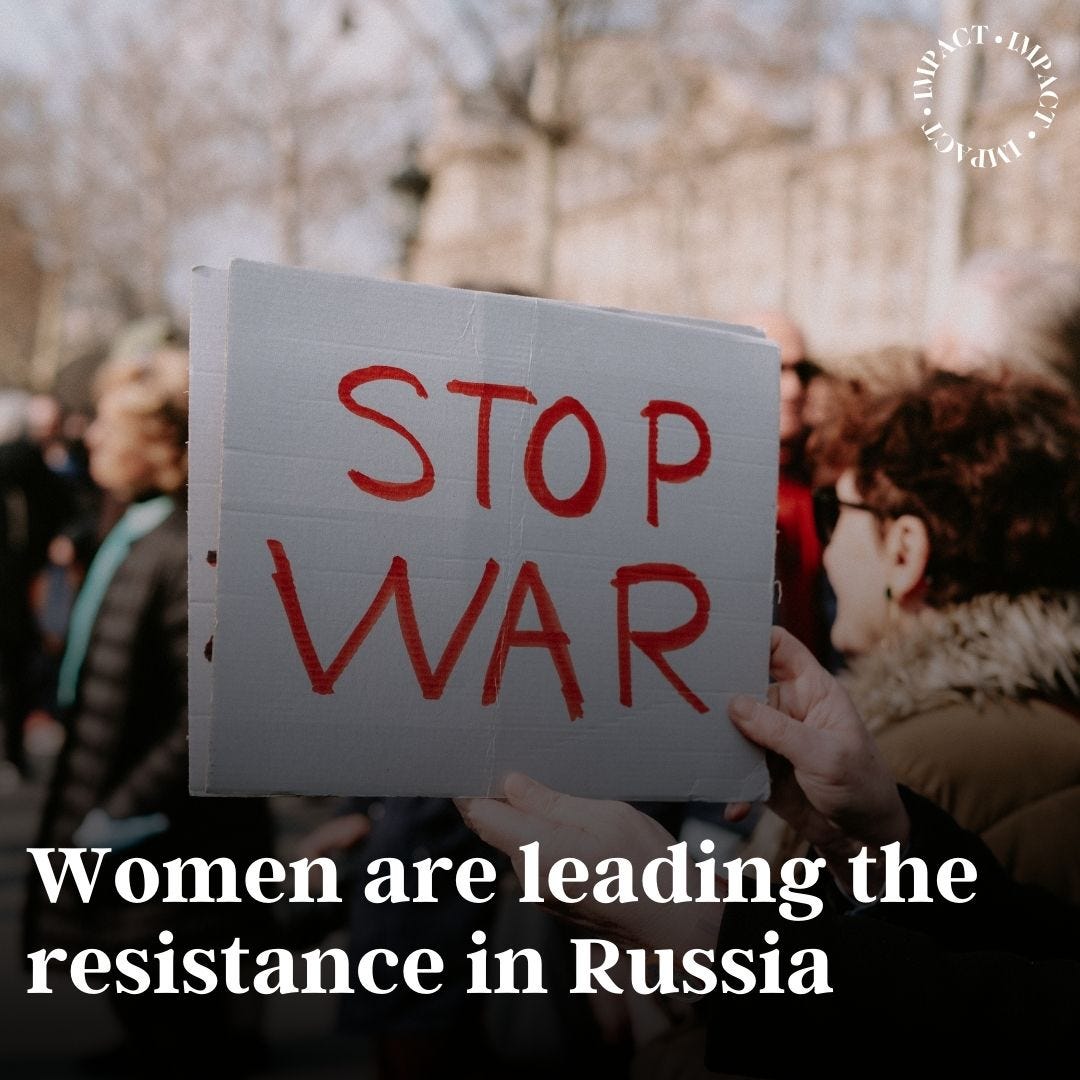A historic marriage in Nepal
+ Russia cracks down on activists
Welcome to The Wrap, a monthly round-up of news on women’s and LGBTQIA+ rights around the world by the Impact newsletter. This month:
- 🏴 Scotland’s foreign policy is feminist now
- 🇵🇱 Poland’s left party introduces two bills to liberalise abortion law
- 🇯🇵 Japan trials morning-after pills without a prescription
Read on for more. And if you want to be up-to-date on feminism worldwide, follow us on LinkedIn or Instagram.
🎉 VICTORY OF THE MONTH 🎉
NEPAL — Nepal has registered its first same-sex marriage. Although the Supreme Court ruled in June that same-sex marriages should be registered immediately, LGBTQIA+ organisations have accused the authorities of not complying with the ruling. But finally, on November 29, the marriage of Maya Gurung, a transgender woman who is recognised as male on official documents, and Surendra Pandey, a cisgender man, was officially recognised. The couple tried to legally register their marriage earlier this year at the Kathmandu District Court, but their petition was refused. So they appealed to the Patan High Court in September, eventually obtaining permission. With a law pending in parliament, Nepal has become the only South Asian country to recognise same-sex marriage, and the second nation in Asia to do so, after Taiwan.
LGBTQIA+ Rights
LATVIA — The Latvian parliament passed a law on November 9 that legally recognises same-sex couples in civil partnerships. The new legislation, which will come into force in mid-2024, grants same-sex couples the right to hospital visits, as well as tax and social security benefits. The vote came three years after a court ruling that stated that unmarried families should be recognised by law. Until now, Latvia was one of the few EU countries that did not recognise any form of civil partnership for same-sex couples, alongside Romania, Bulgaria, Croatia and Hungary. However, a civil union does not give couples the right to adopt children or to inherit in the same way as marriage. In 2005, a constitutional amendment was passed making it explicit that marriage is only allowed between a man and a woman.

Politics and Economics
RUSSIA — A women’s movement has sprung up in Russia to demand the government stop indefinitely posting troops to Ukraine, and allow protesters’ husbands and sons to return home. More than 14,000 women have organised through a Telegram channel called « Put Domoy » (« The Way Home » in English). On November 27, they posted a call to protest against the Kremlin’s lack of response to their demands. The movement has tried to organise massive demonstrations in cities such as Moscow and Krasnoyarsk, but the government has not authorised the protests. In early November, dozens of women started a protest in Moscow centre, but were shut down by the police. Separately, the Russian supreme court has labelled the “international LGBT social movement” an “extremist organisation”, and has banned LGBTQIA+ activists from advertising or holding public activities. There were several raids on gay nightclubs in Moscow after the ruling. This latest development is part of the growing persecution of the LGBTQIA+ community in Russia. In July, President Vladimir Putin signed a law banning gender-affirming care and the ability to change gender markers on official documents, as well as dissolving marriages of transgender people and preventing them from adopting children.
SCOTLAND — The Scottish government has announced it will pursue a feminist foreign policy, publishing a set of guiding principles for promoting gender equality and the rights of women, girls and marginalised groups around the world. It is the first UK nation to embrace a feminist approach to international relations, although foreign policy remains the responsibility of the British government. The paper, published in November, was prepared by Christina McKelvie, Scotland’s Minister for Culture, Europe and International Development. “We want women and girls to be empowered to exercise equal rights and opportunities, have equitable access to economic resources and decision-making, and live their lives free from all forms of violence, abuse and harassment,” she wrote.

IRAN — Iranian feminist activist Narges Mohammadi, winner of the Nobel Peace Prize, has succeeded in her fight to receive medical care without being forced to wear a veil. Mohammadi, who is serving multiple sentences in a Tehran prison, began a hunger strike on November 6, demanding to be taken to hospital, but refusing to cover her hair to do so, as required by Iranian law. She is known for her two-decade struggle against the death penalty and compulsory hijab laws. In October, she won the 2023 Nobel Peace Prize for “her fight against the oppression of women in Iran and her fight to promote human rights and freedom for all”. Mohammadi, who has heart disease, ended her hunger strike after attending a medical check-up and being returned to prison. Also in November, Mohammadi was summoned to the Evin Prosecutor’s Office to hear new charges against her, but she was not authorised to leave prison because she again would not cover her hair.
Reproductive Rights
POLAND — Poland’s left party has put forward two bills to liberalise the country’s strict abortion laws on the first day of the new parliament. Although it holds only 26 seats, Lewica is part of the parliamentary coalition that hopes to form a government after the conservative Law and Justice (PiS) party government failed to win a majority in October 15 elections. Former European Council president Donald Tusk – who is expected to eventually serve as prime minister – has committed to legalise access to abortion if he gains power. The first proposed bill legalises terminations on demand up to 12 weeks’ pregnancy, and up to 24 weeks in cases of rape, incest or risk to the patient’s life. The proposed bill also contains provisions for cases of foetal abnormalities, which were banned as grounds for abortion in January 2021. The second bill decriminalises the act of assisting a person to have an abortion. Under the current law, the penalty for performing the procedure or helping someone get an abortion can be up to three years in prison.
JAPAN — Japan has launched a pilot test to provide the morning-after pill over the counter without a prescription in more than 145 pharmacies, after the measure received 97% approval from the general public in a public consultation. If the initiative is successful, no one will need to go to a clinic or doctor to access emergency contraception, including victims of sexual violence. Not having to pay for a doctor’s visit will make it cheaper to buy the pill, which currently costs the equivalent of US$135. Under the pilot scheme, any adult will be able to buy the pill for US$47-61. Those aged between 16 and 18 years old require parental consent. Contraceptives are not covered by national health insurance in Japan, and although abortion is legal up to 22 weeks, it is necessary to have a male partner’s permission before undergoing the procedure. Earlier this year, abortion pills were finally authorised for use instead of the obsolete method of curettage, which is discouraged by the World Health Organization.
Gender-based violence
ISRAEL — The United Nations has heard evidence of widespread, horrific sexual violence perpetrated by Hamas during its October 7 attack on Israel. The head of the Israeli police’s International Crime Investigations Unit has said that “dozens” of women and some men were subjected to sexual abuse during the attack. Few are believed to have survived, according to the BBC. Women’s rights groups around the world have condemned the silence of international institutions, human rights groups and NGOs on the issue. An investigation into the crimes and the wider events of October 7, in which 1200 people were killed and 240 taken hostage, is ongoing.
SOUTH KOREA — The Seoul High Court has ordered Japan to compensate a group of 16 women who were kept as sex slaves for Japanese soldiers before and during World War II. The victims first filed a lawsuit in 2016 that was rejected by the Seoul Central District Court five years later, which argued that the Japanese government had sovereign immunity under customary international law. That ruling has now been overturned, with the High Court recognising that Japan’s military violated international treaties and Japanese criminal law at the time. The country will have to pay $154,000 for each of the South Korean victims. The only surviving victim is 95-year-old Lee Yong-soo, the other 15 were represented by their families. It is estimated that more than 200,000 women and girls from Asian countries including South Korea, China, the Philippines and Indonesia were forced to have sex with Japanese soldiers during the war. Most of the victims have died without any recognition or compensation.
CONGO — World Health Organization staff sexually abused dozens of Congolese women during the Ebola outbreak, and at least 104 of them have received $250 in compensation, an internal investigation has revealed. The women had to sign a commitment to start an « income-generating activity » as a workaround due to the UN’s stated policy of not paying reparations. A dozen victims were untraced or refused payment. The Ebola crisis in the Democratic Republic of Congo took place between 2018 and 2020, killing more than 2,000 people. A small outbreak also occurred last year.
